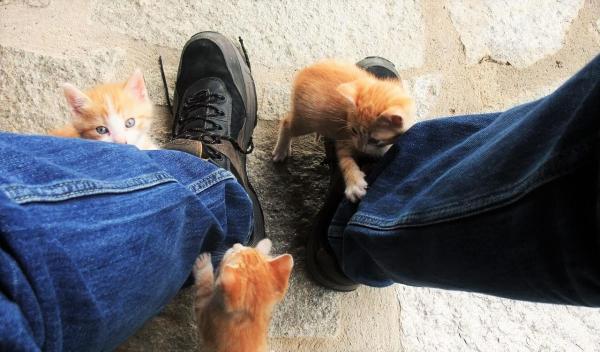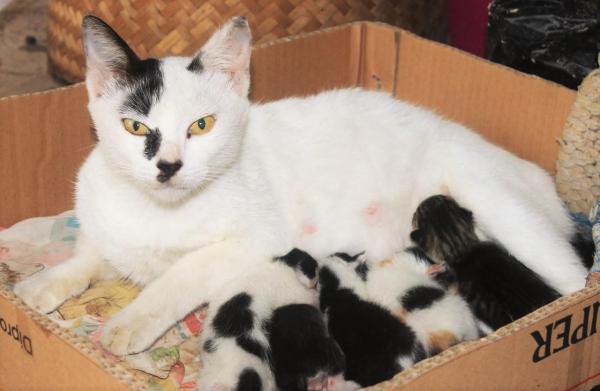
All cat guardians will need to calm down their cat from time to time. They can get excited easily thanks to their drive to play, but we can get confused if they turn aggressive towards us. Even if we have a good relationship with our cat, it is not uncommon for them to scratch or bite us, seemingly without warning. Such attacks are more common when we play or interact with them, but they can also happen suddenly when they are resting. It can even happen when we are not doing anything to them, such as when we are asleep.
At AnimalWised, we ask why does my cat attack me? We understand cat aggression by looking at the context and severity of each attack. We also suggest what you might be able to do about it.
Cat attacks you for health reasons
Perhaps the most important reason why your cat becomes is aggressive is due to a medical problem. This is particularly the case if they attack you all of a sudden, when they hadn't before. When a cat is in pain, they are good at hiding it, but it can lead to frustration and, as a result, aggression.
The first thing we need to do if we suspect our cat is unwell is to take them to a veterinarian. They can determine if they have an acute illness which is causing them pain or even a chronic medical condition which might cause them to attack us. This is often when they develop a hormonal imbalance, as often occurs with endocrine problems such as hyperthyroidism in cats.
In one of the worst-case scenarios, rabies in cats can cause a feline to become aggressive. This is a fatal disease and we need to be careful if we sustain an injury from a cat since it is a feline disease which can be spread to humans.
Play aggression
Cats are natural predators with a keen hunting instinct. As kittens, they learn how to attack their prey by practising on their mother and siblings. Even after they get older, it is common to see young cats attack the feet or hands of their guardian as an extension of this play behavior. While it is usually a sign they feel like we are family, it can be a problem if it continues into adulthood.
Often, it is the cat guardian who reinforces this behavior, even if they don't know they are doing it. When we allow kittens to attack us because we think it is adorable, we are reinforcing that this behavior is OK. Without setting boundaries, the cat can grow older and think that we want to be attacked because it is a normal behavior. It doesn't mean they are even being aggressive, but attacking us out of a sense of fun,
Another factor in cat aggression and play is boredom. Games allow our cat to be both mentally and physically stimulated, releasing energy as they exercise. If we don't play with them, this energy becomes pent up and can be released in various ways, including in attacking us. This is especially the case if we used to play with the cat, but no longer do it as much.
If we want to stop our cat attacking us, we might want to increase our playtime or improve the quality of play.

Cat attacking us out of fear
A cat that is fearful typically adopts a crouched position with their ears back and tail curled inward. They will often lean their body back to get away from the threat. These are all signals we should learn as part of a cat's body language. A frightened cat has three options: flee, remain still or attack. If a cat has no escape and the threat is still present, it is likely they will attack.
Why a cat attacks is more difficult to determine. If we see the cat is turning aggressive, it is possible we are doing something that scare them. Perhaps we are playing too roughly, we have a scent on us they don't like or are intimidating them in some way. However, if the cat attacks us regularly, even if we are being calm, it is possible they are poorly socialized.
When a cat is not properly socialized during the initial socialization period for cats of 4 to 12 weeks of age, they can become distrustful of humans. In this case, we need to use positive reinforcement, be gentle and find ways to calm down an aggressive cat.
Territorial aggression in cats
A cat can attack a human to defend an area of the house they consider their own. The human is then considered a threat that could take away their territory. This does not happen as much with family cats which have developed strong bonds, although it is not out of the question.
This type of aggression generally occurs towards strangers or people who do not usually come to the home a lot. Cats that exhibit this behavior usually urinate in the area that they consider as their territory to mark it. However, there are other reasons for this behavior, which is detail in our article on why your cat is peeing everywhere.
Redirected aggression in cats
Redirected aggression is a peculiar phenomenon that occurs when a cat that is angry or stressed by something or someone. However, instead of attacking the animal or person who has harmed them, they redirect said aggression to another. If you are wondering why your cat attacks you, it is possible it is redirected from somewhere else. The tension due to the cat's anger can be retained for a long time, meaning the attack may seemingly come out of nowhere.
The victim of the cat attack has nothing to do with their anger. However, once it is redirected, they may continue to redirect the attack towards you if they feel it is useful to them. This can happen at any time, but especially during play time with your cat.

Cat attacks during petting
A cat can attack you because they are bothered when you pet them. There are two main reasons for this behavior:
- One cause is that this cat has not been properly socialized and does not understand the friendly intentions of a human.
- The other cause is that they are simply not used to being pampered or are very sensitive. After a while the action can bother them and they attack you out of irritation.
Take a look at why your cat bites you when you pet them for more reasons and understanding of this behavior.
Maternal aggression in cats
All cats that are mothers of kittens are very protective of them. If they perceive a threat they can attack people or animals, even if they have previously shown trust towards them. This reaction is due to the hormones of the cat and is more intense during the first week after giving birth, but usually then progressively decreases.

What to do when your cat attacks you
Each case is different and requires specific management. Now that you have read this article you can know why your cat attacks you, it will be easier for you to adapt your behavior to solve the situation.
The important thing is to always be patient with your cat and not put them in a situation of fear or stress that causes this type of aggressive reaction. You can use positive reinforcement such as petting or giving them a treat when your cat is behaving well.
With patience and understanding the reasons for your cat's behavior, you can help them be more calm and happy in the home. A happy cat is much less inclined to attack you. You can also look at our video below to find some general ways to help a cat feel relaxed:

If you want to read similar articles to Why Does My Cat Attack Me?, we recommend you visit our Behavioral problems category.